Supreme Court Restores Specific Performance Decree in Property Sale Agreement Case
In a significant property dispute that traveled through multiple levels of the Indian judiciary, the Supreme Court has delivered a landmark judgment restoring the specific performance of a sale agreement. The case involved a complex web of allegations, counter-allegations, and conflicting findings by different courts, ultimately requiring the apex court’s intervention to settle the matter.
The legal battle began when Annamalai filed a suit for specific performance of an agreement for sale dated January 8, 2010, against Saraswathi, Dharmalingam, and Vasanthi. The agreement concerned property that originally belonged to Ponnusamy and his daughter Selvi, who had executed registered powers of attorney in favor of Annamalai and Saraswathi. According to Annamalai’s claims, the defendants had agreed to sell the property for Rs. 4,80,000, out of which Rs. 4,70,000 was paid in advance, with the balance of Rs. 10,000 to be paid within six months. Crucially, Annamalai alleged that possession of the property was handed over to him on the date of the agreement.
The plot thickened when Annamalai claimed that the defendants later demanded an additional Rs. 2,00,000, to which he agreed and paid Rs. 1,95,000 on June 9, 2010. An endorsement to this effect was made by the defendants on the back of the agreement. However, on August 20, 2010, the defendants sent a notice cancelling the contract. To make matters more complicated, it emerged that the defendants had already sold part of the property to Vasanthi on August 17, 2010, just three days before sending the termination notice.
The Legal Journey Through Lower Courts
The trial court consolidated two suits – Annamalai’s suit for specific performance and Vasanthi’s suit for declaration and injunction. The trial court dismissed Annamalai’s suit, holding that the agreement was actually a document to secure a loan rather than a genuine sale agreement. The court found it unbelievable that someone would pay Rs. 4,70,000 out of Rs. 4,80,000 and then wait six months for the execution of the sale deed. The trial court also held that Annamalai was not ready and willing to perform his part of the contract and that the endorsement regarding additional payment was created using signatures obtained earlier.
However, the first appellate court reversed this decision. It held that the view of the trial court that the agreement was to secure a loan was perverse, especially since the notice dated August 20, 2010, sent by the defendants themselves acknowledged the existence of the sale agreement and receipt of advance consideration of Rs. 4,70,000. The first appellate court accepted the endorsement of receipt of additional Rs. 1,95,000 and found that Annamalai had established his readiness and willingness to perform his part under the contract. The court also held that Vasanthi, being the daughter of Saraswathi, was not a bona fide purchaser for value.
The High Court, in second appeal, again reversed the decision and set aside the decree of specific performance, directing refund of the advance consideration with interest. The High Court found no evidence to show that Annamalai came into possession of the property and held that he had not shown any intention to execute the sale deed within six months, thereby indicating that he was not ready and willing to perform his part of the contract.
Arguments Before the Supreme Court
Before the Supreme Court, the appellant argued strenuously that the findings of the first appellate court regarding the execution of the agreement for sale, payment of advance consideration including additional amount, and the plaintiff’s readiness and willingness were based on appreciation of evidence and could not be considered perverse or illegal. The appellant emphasized that in a contract to sell immovable property, time is ordinarily not the essence of the contract, especially when more than 90% of the sale consideration was already paid and the defendants had accepted additional payment.
The appellant’s counsel argued: “findings of the first appellate court qua (i) execution of the agreement for sale; (ii) payment of advance consideration including additional amount of Rs. 1,95,000; and (iii) plaintiff being ready and willing to perform the terms and conditions of the contract, were based on appreciation of evidence on record and by no stretch of imagination could be considered perverse or illegal as to give rise to a substantial question of law warranting exercise of powers under Section 100 of the Code of Civil Procedure, 1908.”
The respondents countered that the appellant was not entitled to the discretionary relief of specific performance because he had set up a false case about possession of the property, created a fabricated document showing receipt of additional payment, and took no steps within six months to seek execution of the sale deed. They also argued that once the contract was terminated, the suit for specific performance was not maintainable without seeking a declaration that the termination was invalid.
The respondents submitted: “the appellant is not entitled to discretionary relief of specific performance, inter alia, because,- (i) a false case was set up that the possession of the property was handed over to the plaintiff at the time of entering the contract; (ii) a fabricated document showing receipt of an additional sum of Rs. 1,95,000 was set up; (iii) the appellant took no steps within six months of the agreement to seek execution of sale deed, therefore, plaintiff cannot be said to be ready and willing to perform its part under the agreement.”
Supreme Court’s Analysis and Reasoning
The Supreme Court, comprising Justices Manoj Misra and J.B. Pardiwala, identified three main issues for consideration: whether the High Court was justified in interfering with the first appellate court’s finding regarding payment of additional amount; whether the suit for specific performance was maintainable without seeking declaration that termination was invalid; and whether the plaintiff was entitled to discretionary relief of specific performance.
On the first issue, the Court strongly criticized the High Court’s approach in discarding the endorsement of receipt of additional payment. The Court noted that once the existence of signatures on a document acknowledging receipt of money is admitted, a presumption arises that it was endorsed for good consideration. The defendants’ claim that their signatures were obtained on blank paper was found to be insufficient to discharge this burden.
The Court made a significant observation: “Once the finding regarding payment of additional sum of Rs.1,95,000 to D-1 and D-2 recorded by the first appellate court is sustained, there appears no logical reason to hold that the plaintiff (Annamalai) was not ready and willing to perform its part under the contract particularly when Rs. 4,70,000, out of total consideration of Rs. 4,80,000, was already paid and, over and above that, additional sum of Rs.1,95,000 was paid in lieu of demand made by D-1 & D-2.”
The Court further elaborated: “Generally, time is presumed not to be the essence of the contract relating to immovable property. Therefore, onus to plead and prove that time was the essence of the contract is on the person alleging it.”
On the second issue regarding maintainability of the suit without seeking declaratory relief, the Court held that a declaratory relief would be required only where a doubt or cloud exists on the right of the plaintiff and grant of relief is dependent on removal of that doubt. In this case, by accepting additional payment after the expiry of six months, the defendants had waived their right to forfeit the advance consideration and acknowledged the subsistence of the agreement.
The Court explained: “by accepting Rs.1,95,000 after expiry of six months, D-1 and D-2, firstly, waived their right, as available to them under the contract, to forfeit the advance consideration/ earnest money, secondly, by such acceptance and endorsement on the back of the agreement they treated the contract as subsisting.”
On the third issue regarding discretionary relief, the Court found that this was not a fit case where such relief should have been denied. The plaintiff had already paid over 90% of the agreed consideration and additional amount as demanded by the defendants. The Court also noted that Vasanthi was a related party of the defendants and therefore not a bona fide purchaser.
Final Judgment and Directions
The Supreme Court allowed the appeals and set aside the judgment and decree of the High Court, restoring that of the first appellate court. The Court directed that the plaintiff-appellant shall deposit the balance amount of Rs. 10,000, if not already deposited, in the execution court within one month.
In its concluding remarks, the Court stated: “For the aforesaid reasons, we are of the considered view that the High Court erred in law by interfering with the decree of specific performance passed by the first appellate court. These appeals are therefore allowed. The judgment and decree(s) of the High Court is/are set aside and that of the first appellate court is/are restored.”
This judgment reinforces several important principles of contract law, particularly in real estate transactions. It emphasizes that time is generally not the essence of contracts involving immovable property, that acceptance of additional payment after the stipulated period constitutes waiver of rights, and that appellate courts should not lightly interfere with findings of fact made by lower appellate courts. The decision serves as an important precedent for similar property disputes where one party attempts to resile from a contract after receiving substantial payments.
Petitioner Name: Annamalai.Respondent Name: Vasanthi and Others.Judgment By: Justice Manoj Misra, Justice J.B. Pardiwala.Place Of Incident: Not specified in judgment.Judgment Date: 28-10-2025.Result: allowed.
Don’t miss out on the full details! Download the complete judgment in PDF format below and gain valuable insights instantly!
Download Judgment: annamalai-vs-vasanthi-and-others-supreme-court-of-india-judgment-dated-28-10-2025.pdf
Directly Download Judgment: Directly download this Judgment
See all petitions in Contract Disputes
See all petitions in Property Disputes
See all petitions in Specific Performance
See all petitions in Damages and Compensation
See all petitions in Judgment by Manoj Misra
See all petitions in Judgment by J.B. Pardiwala
See all petitions in allowed
See all petitions in supreme court of India judgments October 2025
See all petitions in 2025 judgments
See all posts in Civil Cases Category
See all allowed petitions in Civil Cases Category
See all Dismissed petitions in Civil Cases Category
See all partially allowed petitions in Civil Cases Category







